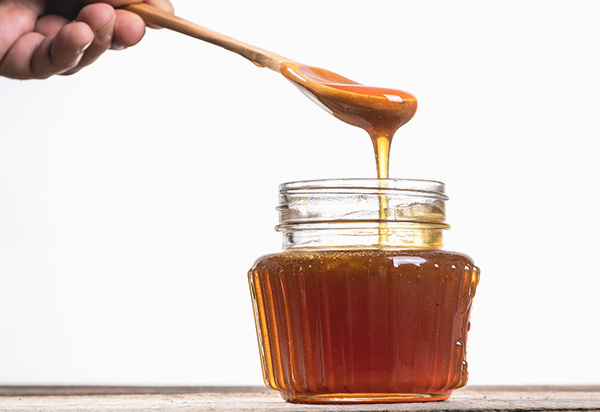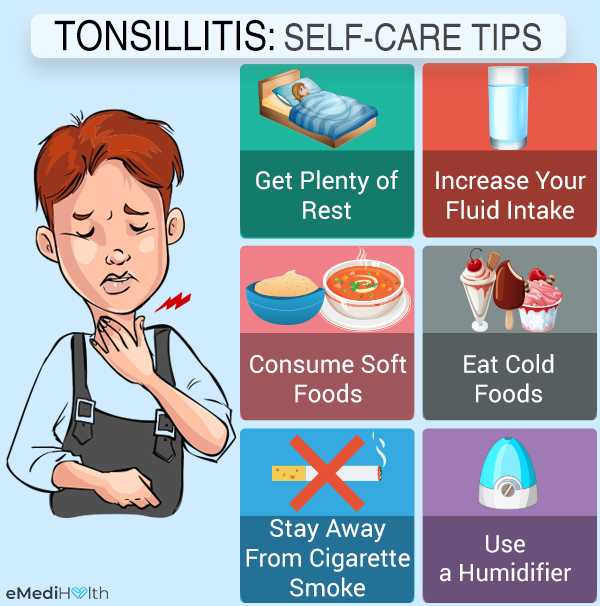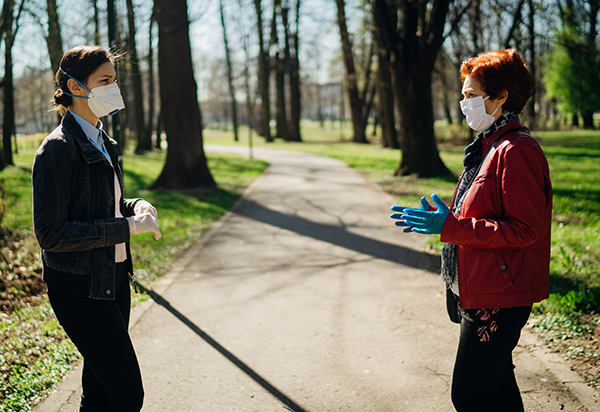In this article:
Tonsils are a pair of lymph nodes present on either side at the back of the throat. They help prevent infections by producing antibodies. However, at times, the tonsils may get attacked by a bacteria or virus and swell up. This inflammation of the tonsils is known as tonsillitis.

The treatment for tonsillitis varies with its cause and severity. However, using some home remedies and self-care tips can aid a faster recovery.
Home Remedies for Tonsillitis
The following at-home treatments can help improve the infection and provide relief from the symptoms of tonsillitis:
1. Gargle with salt water
Salt water works as a mild antiseptic solution that also helps soothe the irritated and swollen walls of your throat.
Rinsing your throat with salt water frequently throughout the day may provide quick relief without any adverse side effects. (1) The effectiveness of this therapy is yet to be established clinically, but it enjoys overwhelming anecdotal success.
How to use:
Mix ¼ to ½ teaspoon of salt in 250 ml of warm water. Check the temperature of the water before gargling to make sure it is not too hot.
2. Consider over-the-counter treatments
You can suck on benzocaine-containing lozenges or use oral sprays to relieve the discomfort in your throat. Herbal lozenges, such as those containing honey and ginger, can also be used. (2)
Caution: Lozenges are not recommended for children as they may try to swallow the hard tablet and end up choking on it.
3. Consume honey

Honey possesses antiseptic, antimicrobial, anti-inflammatory, and soothing properties that help treat tonsillitis. (3) Honey was also found to be useful in reducing postoperative pain and dependence on pain medicine in tonsillectomy patients. (4)
How to use:
Consume 1 tsp of honey daily, or mix it with ginger, garlic, or cinnamon and consume. (5)
Caution: Avoid giving honey to children below 1 year of age to prevent the risk of botulism.
4. Drink warm tea
Sipping on a cup of warm tea can help soothe the aching throat. Moreover, using herbs such as ginger in your tea can render it with antimicrobial properties. You can also add honey and lemon to enhance the taste and effect of the tea.
However, there is no study to support this claim and therefore, herbal teas should be used upon consulting a doctor.
5. Apply a warm compress
The heat from a warm compress can help soothe a sore throat.
How to use:
Soak a fresh cloth in warm water, wring out the excess water, and place the cloth on your throat. Alternatively, you may also use a hot water bottle or a heated rice pad.
Self-Care Measures for Tonsillitis
Various lifestyle changes and self-care measures can help improve tonsillitis.

1. Get plenty of rest
A well-rested body is better equipped to fight an infection. Your body repairs and re-energizes itself during sleep. Denying yourself proper rest and sleep will only delay your recovery process. It is necessary to give rest to your throat as well. Avoid shouting or excessive talking.
2. Increase your fluid intake
Tonsillitis can irritate the lining of your throat and make it feel increasingly scratchy, parched, and sore. Moreover, the swollen tonsils can make it extra hard for you to gulp down fluids, which can render you dehydrated over time.
Keeping your body well hydrated is fundamental to the recovery process. It is best to stick to moderately warm liquids instead of hot or cold ones.
3. Consume soft foods
Enlarged tonsils constrict the passageway of food and make swallowing considerably difficult and painful. Thus, it may be best for you to eat soft foods, which go down easily through your throat. Solid or hard foods, especially those with spices, which can further irritate the sore throat.
4. Eat cold foods
Patients with tonsillitis are often advised to eat frozen foods such as ice cream, popsicles, and ice pops to soothe their irritated throat.
However, having cold desserts that contain a lot of sugar can be counterproductive. To avoid any undue complications, discuss the appropriate options with your doctor.
5. Stay away from cigarette smoke
You must avoid both active and passive smoking, as inhaling tobacco fumes can worsen the underlying infection and delay recovery.
6. Use a humidifier
A cool mist vaporizer or humidifier helps add moisture to the surrounding air. This helps prevent dryness, swelling, and discomfort in the throat.
How to Prevent Tonsillitis?

Follow these guidelines to keep yourself from getting infected:
1. Maintain distance from infected people
Tonsillitis spreads easily from one person to the next. Thus, you should maintain a healthy distance from anyone who is currently struggling with this condition or even a sore throat.
Moreover, you should not share utensils and personal items with anyone who has active tonsillitis or is suffering from a sore throat.
2. Maintain hygiene
You come into contact with all sorts of contaminated objects and surfaces. Thus, it is essential for you to wash your hands several times a day, especially before eating or touching your face.
Carry a hand sanitizer with you when venturing out to keep your hands clean at all times.
3. Cover your mouth
Whenever you feel a cough or a sneeze coming, you must cover your mouth with your hands. Make sure to wash your hands thereafter. You can also keep a clean cloth handy for this purpose, especially when fighting a cold or flu.
4. Use a nasal saline
Try to keep your nose as clean as possible – use a nasal saline mist to protect yourself from inhaled germs.
5. Practice good oral hygiene
In addition to regular toothbrushing and flossing, consider using over-the-counter antiseptic oral rinses during the cold and flu season, especially if you recently came in contact with an infected individual.
6. Treat your allergies
It is vital to avoid allergens and treat allergies as needed because allergic inflammation makes you more susceptible to infection.
7. Get vaccinated
Talk to your doctor about getting vaccinated. Bacterial vaccinations such as Prevnar, Pneumovax, and HiB offer protection from other airway infections and may reduce the risk of tonsillitis.
Most-Asked Questions About Tonsillitis

Does tonsillectomy prevent one from contracting a strep throat infection?
Even though this bacterial infection primarily targets the tonsils, it can spread to other tissues in the throat as well. So, it is entirely possible for a strep throat to occur even after tonsillectomy but the chances of that happening are low.
Is tonsillectomy safe?
Tonsil removal continues to be one of the most common and safest surgical procedures that are routinely recommended for children and teens with enlarged tonsils.
Can lemon help in symptomatic relief from tonsillitis?
While the use of lemon for tonsillitis is anecdotally popular, its acidic nature can further irritate the throat. Therefore, it is best to consult a doctor before using such remedies.
Final Word
The tonsils are among the body’s foremost defensive mechanisms against any germ, bacteria, or virus that finds its way into your throat through the respiratory route or the mouth. However, at times, they may themselves get infected by pathogen cases.
Taking some self-care measures and using home remedies can help subside the symptoms and treat the mild infection. Contact a doctor if the condition is persistent.

- Was this article helpful?
- YES, THANKS!NOT REALLY


